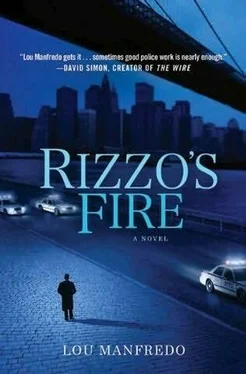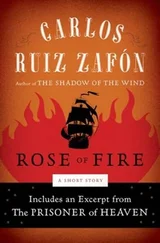“Linda?” the young woman asked. “Linda doesn’t work here anymore, Officer.”
“Oh?” Rizzo asked. “Since when?”
“I’m not sure… If I had to guess, maybe about a year.”
“Okay,” Rizzo said. “Was she a first reader here?”
The woman shook her head. “No, not when she left. Maybe she started as one, but I wouldn’t know.”
“So what was Ms. DeMaris?” Priscilla asked. “An agent?”
“No,” the woman said, her voice lowering, her eyes widening once more. “Is Linda in some kind of trouble?”
“No, nothing like that,” Rizzo said. “We just need to ask her about something, no big deal. But tell me… was she an agent?”
“No, sir, she was an administrative assistant. To Helen.”
“Helen?” Priscilla asked.
“Yes, Helen Crothers, one of the agents here.”
Rizzo nodded. “Do me a favor, will you? Get ahold of Helen. We’d like to speak to her.”
The woman reached for the intercom. “Sure,” she said. “Helen’s usually out to lunch at this hour on Mondays, but she happens to be here today. I’ll get her.”
HELEN CROTHERS was in her mid-fifties, sharp-eyed and intelligent-looking, her black hair short and dabbed in gray. She smiled across her desk at the two detectives.
“So,” she said. “How can I help you?”
“Well,” Rizzo said, “we wanted to speak to Linda DeMaris, but we understand she no longer works here.”
“Yes, that’s correct. She left about a year ago.”
Priscilla spoke up. “She was your administrative assistant?”
“Yes, that’s correct.” She frowned. “Is Linda okay? Is everything all right?”
“Far as we know, yeah,” Rizzo said. “We just need to ask her a question or two.”
“Is there anything I can help you with?” Crothers asked.
“Maybe you can,” Rizzo said. “Let me ask you, as an administrative assistant, did Ms. DeMaris screen incoming manuscripts? You know, unsolicited stuff the agency receives for representation?”
“Sometimes, but not very often. Actually, Linda resisted those assignments.” She smiled. “She’d spent more than a few years as a first reader, Detective. Her promotion to A.A. was somewhat long in coming.”
“So she did have a history here as a reader?” Priscilla asked.
“Most definitely,” Crothers answered. “As I said, for a good number of years, until about fours years ago.”
“And, as your assistant, she’d still occasionally read submissions that came in unsolicited?”
“Yes. Occasionally.”
“Ms. Crothers, you ever hear of a guy named Robert Lauria? From Brooklyn? Wrote an unproduced play called A Solitary Vessel ?” Rizzo asked.
The woman frowned, then shook her head. “No, those names are not ringing a bell. Why?”
“His name came up on a case we’re working,” Rizzo said. “It turns out he submitted a play to this agency and it was rejected by Ms. DeMaris. We were just hoping maybe she had some additional info on the guy.”
“That would be unlikely, Detective,” she replied. “We process hundreds of submissions each year.”
“So we’ve been learning,” Priscilla said. “Do you keep any record of them?”
Crothers tossed her head from side to side. “Yes and no. When a first reader turns down a work, generally no record is kept. But when something goes beyond the first reader and receives serious consideration, it will often be entered into our databank.” She turned to the computer on her desk. “What were those names again?”
After keying in the information, Crothers shook her head. “No,” she said. “Neither is showing here.”
Rizzo nodded. “Okay, thanks, we’ll just talk to Ms. DeMaris. Do you know where she’s working now?”
“Oh, yes, Detective, I can help you with that. You see, Linda left us for a marvelous opportunity that opened up for her.”
“Oh?” Priscilla asked. “And what was that?”
Crothers’s smile broadened. “A personal assistant position for a very important and influential man.”
Rizzo crossed his leg, sitting back in his seat. “And who might that be, Ms. Crothers?”
“Thomas Bradley,” she said. “The Broadway producer. Have you heard of him?”
Rizzo turned to Jackson, and they exchanged smiles. Turning back to Crothers, he began to stand as he answered her.
“Oh, yeah,” he said. “His name does ring a bell.”
SEATED IN the Impala on Seventh Avenue, Rizzo turned to Jackson with a smile.
“It’s always the last place you look, Cil,” he said, “every time.”
Priscilla started the engine. “And of all the suspects, you left Bradley for last.”
“Yeah,” he said. “Bradley looked good to me almost from the beginnin’. Remember when we talked to Kellerman, Mallard’s agent, and I told you speaking to him was pure gold?”
“Yeah, I remember,” Priscilla answered.
“Kellerman was the first guy to mention the rift between Mallard and Thomas Bradley, you know, how Mallard wanted that female character to be screwin’ the two brothers and Bradley didn’t. That’s what tipped me. Lauria’s play, the one that Bradley seems to have stolen, had no love triangle. Mallard put it in there on his own. He was a horny son of a bitch, wasn’t he? Four wives, all those girlfriends, the guy’s life revolved around women. Lauria, on the other hand, saved his nickels and dimes for phone sex and blow jobs at the massage parlor. The play idea appealed to Mallard, but he wanted to spice it up with the sex angle. Bradley wanted to keep it pure, the way Lauria originally wrote it.”
“You think Mallard and Bradley were in it together?” Priscilla asked.
He shrugged. “I dunno. Could be. But more likely it was just Bradley, and he spoon-fed it to Mallard.”
“Why you leanin’ that way, Joe?”
“It makes the most sense. Bradley steals the play, feeds it to Mallard. Bradley knows the play’s good, great even. He also knows he’s got no chance in hell of raisin’ a few million bucks to stage a Broadway production of a play written by some asshole from Brooklyn. But, if he gets Avery Mallard’s name on it, and he hypes it as a second Pulitzer by the American master, all the fat-cat art patrons in the city start liquidatin’ assets and tossin’ cash into Bradley’s hat.”
Priscilla nodded, easing the car out into the speeding downtown traffic. “So Bradley originally got the play from Linda DeMaris.”
“Bingo. DeMaris spent years eatin’ shit at that agency, then finally she gets a promotion. But every once in a while, some boss, maybe Crothers, says, ‘Hey, Linda, you ain’t doing anything, go help out with that slush pile.’ DeMaris gets pissed, but she’s gotta do what she’s told. So she grabs something off the pile and actually starts reading it. And it’s fuckin’ great. So, what to do with it? Hand it over to Crothers, then go out and get coffee for the big agents’ meetin’ that afternoon? No, DeMaris has a lead in to a big Broadway producer. Maybe she was sleepin’ with the guy already, maybe not, but she takes the play to him, and this plot to reject Lauria and spoon-feed Mallard gets hatched.” Rizzo smiled.
“Dollars to fuckin’ doughnuts, Cil, we get Mike to access the un-censored copy of the ‘confidential’ statement Bradley gave Manhattan South, that alibi mistress of his turns out to be Ms. Linda DeMaris.”
“So, Mallard comes up clean here?” Priscilla asked.
He shrugged. “My money says he does, and here’s why. When Lauria learns about An Atlanta Landscape, he freaks. He knows it’s his work, only with a sexy female screwin’ the brothers tossed into the mix. Then he finds out Kellerman is Mallard’s agent, and he sends a letter, through the agency, to Mallard. Mallard reads it, and in his heart, he knows it was Bradley who spoon-fed him the play under the guise of just helping him write it. I’d bet my pension Mallard never once saw the actual Lauria script. It seems unlikely a guy of his stature would deliberately plagiarize so blatantly. So he goes to Bradley and says, ‘What the fuck?’ He demands an explanation. Maybe threatens goin’ direct to Lauria. Bradley says, relax, it’s just a nut trying to make a score with some phony plagiarism claim. But Bradley’s still worried. He knows Lauria wrote the play, and maybe the guy could prove it. Maybe with one a those whaddaya-call-its? Poor man’s patents. So Bradley sees his entire career goin’ down the shitter. And Mallard’s, too. Bradley’ll forever be known as the guy who destroyed Avery Mallard’s literary legacy.”
Читать дальше












